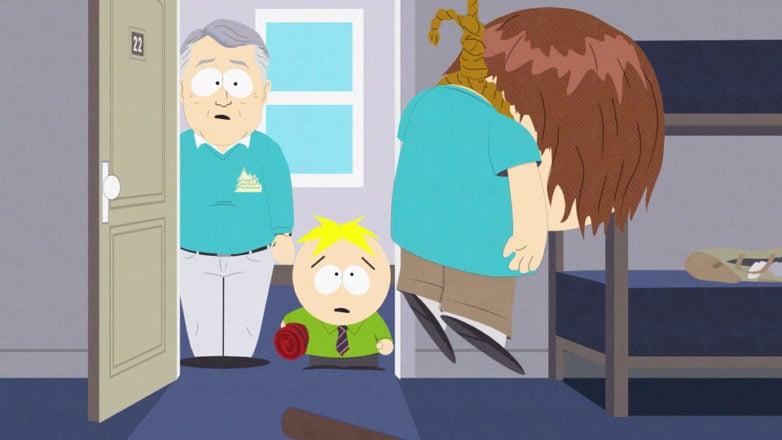
Conversion therapy became infamous after the 2007 “South Park” episode “Cartman Sucks.” Butters Stotch’s parents thinks he is “bi-curious” and send him a pray-the-gay-away camp, where several youth commit suicide after being told they are sexually confused. The Supreme Court on Monday rejected over the objections of three conservative justices a Christian therapist’s free speech challenge to a Washington state ban on conversion therapy for minors. Photo: Comedy Central.
The Supreme Court on Monday rejected a Christian therapist’s free speech challenge to a Washington state ban on conversion therapy for minors.
Favored by some anti-gay conservatives, the widely discredited practice pushes gay or lesbian minors to change their sexual orientations and transgender children to identify as the gender identities assigned to them at birth.
Washington is one of 26 states that have banned or restricted such therapy for minors. In 2013, California became the first state in the union to ban the practice on minors.
“This is a victory for LGBTQ+ civil rights. The research is clear — conversion therapy does not work, and can be particularly harmful to minors,” Washington Attorney General Bob Ferguson said in a statement.
‘1946’ movie: Word homosexual first appeared in Bible in 1946
The Supreme Court’s decision to not hear the case means the Washington law stays in place, and that the lower court ruling remains.
The U.S. Court of Appeals for the Ninth Circuit said the government can regulate the conduct of medical professionals, especially when it concerns the safety of minors.
Justices Clarence Thomas, Samuel Alito and Brett Kavanaugh said they would have heard the appeal.
In his dissent, Thomas claimed the existence of “a fierce public debate over how best to help minors with gender dysphoria” and that the state had “silenced one side of this debate.”
In a separate brief opinion, Alito said the case “presents a question of national importance” that clearly implicates free speech issues.
Conversion therapy became infamous after the 2007 “South Park” episode “Cartman Sucks.” Butters Stotch’s parents think he is “bi-curious” and send to him a pray-the-gay-away camp, where several youth commit suicide after being told they are sexually confused.
More than 75,000 LGBT youth in the United States and before they reach adulthood will be subjected to the dangerous and discredited practice of conversion therapy from a licensed healthcare professional or a religious or spiritual advisory, according to a 2018 study from the Williams Institute at the UCLA School of Law.
Every respected medical and mental health organization in the world considers attempts to change sexual orientation and gender identity potentially dangerous. The American Psychiatric Association says that sexual orientation change efforts can lead to “anxiety, depression, and self-destructive behavior,” including suicide.
The American Psychological Association says, “There is simply no sufficiently scientifically sound evidence that sexual orientation can be changed.”
Brian Tingley, a licensed marriage and family counselor, said the law violates his free speech rights under the Constitution’s First Amendment because the government is seeking to dictate what he says.
“The law clearly violates the First Amendment by censoring counselors like Brian, and that ultimately hurts his clients,” said John Bursch, a lawyer at Alliance Defending Freedom, a conservative Christian legal group that represents Tingley.
Tingley, his lawyers said in court papers, “believes that the sex each person receives at conception is not an accident or error but rather a gift from God” and sexual relationships should occur only “between one man and one woman mutually committed through marriage.”
Tingley markets his business on those grounds, serving clients who “want to become comfortable with their biological sex” or seek “help to direct their focus to opposite-sex relationships,” the lawyers said.
The Alliance Defending Freedom has had recent success arguing religious rights and related cases at the court.
Ferguson, defending the law, said in court papers that it was not a pressing issue considering that Tingley is the only licensed therapist in the state who has objected to it.
The state argued that the law, enacted in 2018, regulates conduct only as part of a professional licensing requirement and has only an incidental impact on speech rights.
The law prevents licensed therapists from conducting conversion therapy only in professional settings, Ferguson added, noting that it does not prevent similar counseling from taking place in other settings, including churches.
